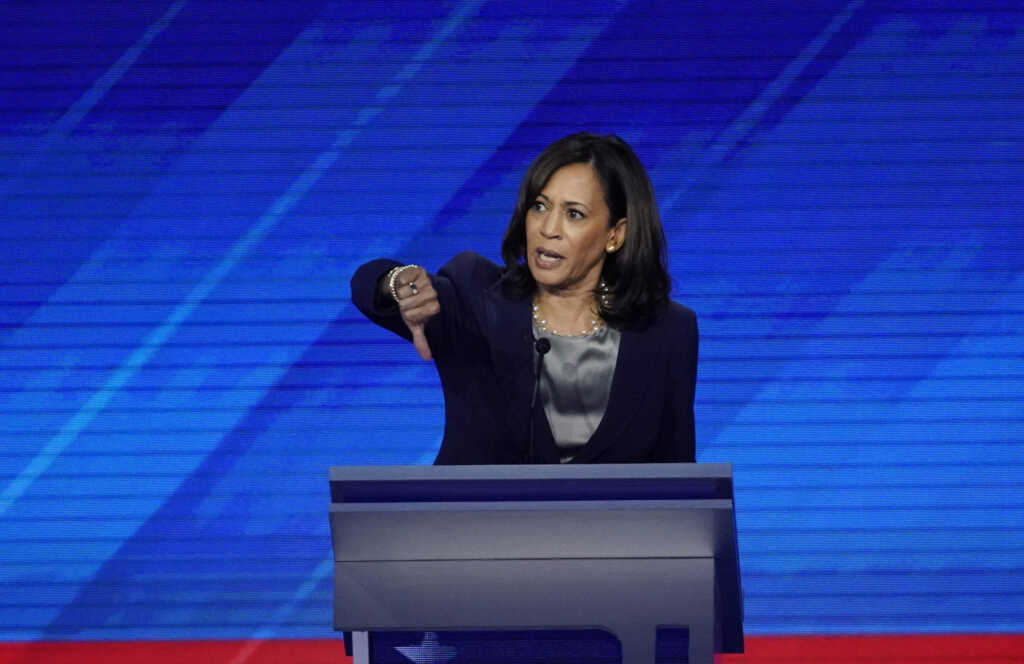Less than a week ago, Nick Pacilio was a relatively unknown person — one of many staffers employed at Twitter’s San Francisco headquarters. But in recent days, he’s found himself at the center of a political maelstrom sparked by presumptive Democratic presidential nominee Joe Biden’s decision to tap Sen. Kamala Harris (D-Calif.) as his running mate.
From 2011 until 2014, Pacilio served as the deputy spokesperson and senior spokesperson for Harris, who was California’s attorney general at the time. After leaving his job with Harris, Pacilio joined Twitter, where he first served as a senior communications associate and was later promoted to a manager position, which he still holds today.
His communications role at the social media company was one that didn’t garner too much attention until Tuesday, when Biden selected Harris as the presumptive Democratic vice presidential nominee. At that point, conservative writers began expressing concerns over Pacilio’s political bonafides and his ostensible connection to Harris.
Before bowing out of the running for the Democratic presidential nomination, Harris frequently argued Twitter should suspend President Donald Trump’s account and even sent a letter to the Twitter headquarters to make her case. To the tech company’s credit, Vijaya Gadde, who helms Twitter’s trust and safety teams, responded to Harris, telling the California senator it would not be suspending the president’s account.
“We understand the desire for our decisions to be ‘yes/no’ binaries, but it is not that simple,” explained Gadde. “We reviewed the tweets you cite in your letter, and they do not violate our policies against abusive behavior, targeted harassment, or violence on the service.”
That was in 2019. It should be noted, though, Twitter has since censored two of Trump’s tweets, each of which the Silicon Valley company placed behind “public interest” notices. The notices put the tweets in question behind warnings that described Trump’s words as “abusive” and “glorifying violence” and limited how users could interact with the posts. Twitter first censored Trump in May, when he tweeted, “When the looting starts, the shooting starts.” The company repeated the same action in June, when he warned potentially violent demonstrators in Washington, D.C., that they would be met with “serious force” if they attempted to set up an “autonomous zone” outside the White House.
Then, in early August, Twitter and Facebook blocked a video shared by accounts linked to the president’s re-election campaign. The “Team Trump” account was temporarily barred from posting new tweets after it shared a clip of an interview Trump did last Wednesday on “Fox & Friends,” when he suggested children are “virtually immune” to serious coronavirus infections. Both social media companies claimed the posts violated their respective policies about sharing coronavirus “misinformation.”
Pacilio released a statement via Twitter explaining his employer’s decision to punish the “Team Trump” account for the tweet in question. His statement was intended to clarify misreported information from The Washington Post, which initially claimed it was Trump’s account rather than a campaign account that Twitter blocked.
So here’s where the issue comes in: Due to Harris’ desire to see Trump barred from Twitter, as well as Pacilio’s past work with the senator, it’s understandable some conservatives see the potential for a conflict of interest, particularly at the height of a combative presidential election involving a Republican president who is known for using Twitter as a primary means of communication with the public.
While the National Review’s initial story about Pacilio wasn’t accurate (writer David Harsanyi incorrectly claimed Pacilio was “in charge of deciding what the president of the United States can and can’t say on Twitter”), it doesn’t seem unreasonable to think Pacilio — even as a spokesperson — could use his platform within Twitter to advocate something politically beneficial to Biden or Harris, his former boss.
However, Brandon Borrman, vice president of global communications at Twitter, has argued his coworker “plays no role” in deciding what tweets are censored or blocked.
National Review has since updated its story.
Even if this latest hubbub over Pacilio is much ado about nothing, it is reminiscent of the fact there are concerns about political preferences guiding the actions taken by executives at Twitter, which has become a virtual public square over the last decade.
For example, while the company has flagged tweets by Trump and his campaign, the site has allowed anti-Semitic, genocidal missives by Iranian Ayatollah Ali Khamenei to go entirely uncensored. In defense of that double standard, a Twitter spokesperson said in late July during a hearing at the Knesset in Israel that the supreme leader’s tweets are a “commentary on political issues of the day.”
So it’s not as if the concerns are unfounded.
As for Pacilio, his past work in politics shouldn’t necessarily disqualify him from holding the position he now has at Twitter; but we should fight against the instinct toward cancel culture, whether it comes from the left or right. What it does mean, though, as it would for anyone, is his political perspectives likely have a large influence on his professional decisions.
Though Twitter certainly has conservative people on staff, that reality hasn’t shifted the makeup of the company away from its progressive leanings. In 2018, Twitter CEO Jack Dorsey admitted as much, when he told New York University journalism professor Jay Rosen conservative staffers “don’t fee safe to express their opinions” within the company.
“They do feel silenced by just the general swirl of what they perceive to be the broader percentage of leanings within the company,” he said, “and I don’t think that’s fair or right.”
Dorsey said he made the admission because he’d “rather know what someone biases to rather than try to interpret through their actions.”



